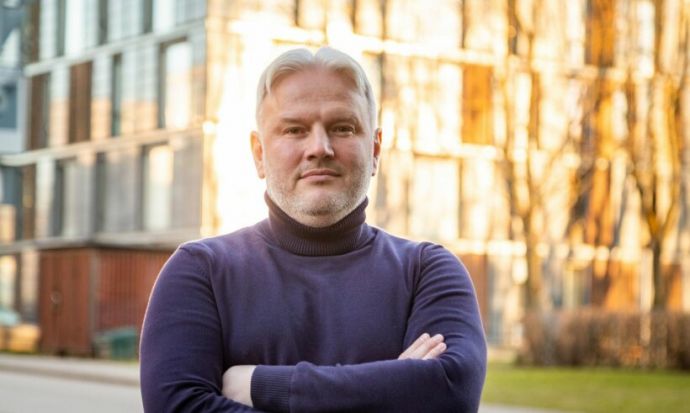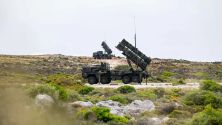Volodymyr Dubovyk, Director of the Center for the International Studies, spoke on US Secretary of State Antony Blinken’s trip to South Africa as a way to stop this aggression against Ukraine and against the world in the air of UA and Dom TV channels. Find out the text version of his interview.
Read also: Blinken Africa trip. New continental strategy (VIDEO)
These days Mr. Blinken has visited The Republic of South Africa, Congo, Rwanda. What are the main results of this visit?
We’ll see the results later, but we can see what he’s trying to do. What Washington is trying to do. They’re trying to counter the Russian narratives in Africa. And, frankly, those Russian narratives have been successful to a certain extent, to a large extent, trying to blame the West and the needle on US, on the ongoing Russian aggression against Ukraine. Shifting the blame from the actual culprits and the actual perpetrator, which is the Russian Federation, on to Ukraine and Ukraine supporters in the West. Why Africa matters is because there are many countries there, and they have their seats at the United Nations, for instance. And they have also been affected by this shortage of supply, food supply from both Ukraine and Russia, or bean, the soybean and the sunflower oil, and grain, and wheat, and stuff like that, which was shortened, that supply, by the fact of Russian aggression and the Russian blockade of Ukraine’s Black Sea ports. But Russia has been trying, for months already, to show that it’s not their fault, that it’s not because of Russian aggression, the Russian blockade of Odesa. But, of course, it is because there are sanctions on Russia, placed by the West, which is a complete misconstruction. Because no, it is not because of their aggression and their blockade. So the West is trying to help us not just militarily, sending weapons to us, not just by sending humanitarian assistance, but also in a big ideological propaganda information war. And this is becoming global already, and the Global South, so-called ‘Global South’ which Africa belongs to, is a part of this information warfare. Russia is trying hard, and we know that Minister Lavrov, Minister of Foreign Affairs of Russia, has been there as well, trying to peddle this line of thought that, you see, aggressive West, imperialist West is somehow behind the whole war. And that is very important, then for others, for our allies in the West, to try to counter this way, to counter value of this was their own merit to narratives and messages. And, frankly, they’ve been trying. Quite recently, Mr. Macron, president of France, was also in Africa in several places. And he also said, look, you need to see who really is the imperialist here. It is Russia. You need to see who is waging the war and who is to blame for the shortage of the food supplies. And you need to see if you are trying to be a democratic society. You need to see which country is democratic and which one is authoritarian in this Russia-Ukraine conflict. So we should probably see all of it in this context, I think.
Does the Global South really understand now all the consequences of the Russian Federation aggression? Is the Global South ready to help to stop this aggression?
I don’t think the Global South will weigh in decisively or resolutely in support of Ukraine. I don’t expect them to do that. But at the minimum, they might open their eyes in terms of what’s happening, what’s going on and pay more attention and definitely stop buying Russian propaganda, and stop believing Russian propaganda. That would be already a big result if they are still thinking this is a continuation of the old Cold War when you had west and East Moscow and Washington, and they were certainly on the periphery of that, and many of those countries were in the so-called ‘Non alignment movement’, you know, and then try to be distant from Brussels, Washington and Moscow. This is different times. It’s not a Cold War now. This is different times. And you can choose who you root for, or at least you can not support Russia in trying to diminish Ukraine, or subjugate Ukraine, or occupy Ukraine. And this is an important diplomatic effort, but this is also an important geopolitical effort as well, because, frankly, not just Russia trying to spread the analogy for now, Africa, for instance, but also China is having a big presence in many ways in Africa, economically, militarily, even in some places, and definitely in terms of their ideology, ideological presence. China, as we know, is also an opponent of the United States. And China, as we know, is also rhetorical, at least propagandistic elites, big ally of Russia. Luckily enough, Beijing decided against sending weapons or troops, God forbid, to help Russia fight the war against Ukraine. But they are siding together against the West, and they do. And they are singing the same song of Night on US and the West being to blame for the whole war, even though this is not true. So, therefore, Blinken, touring those countries, is doing a double job. He’s not only pushing back and against the Russian narrative, but he is also trying to return with American diplomacy to Africa. I mean, surely America has never left Africa diplomatically, but it’s own, you know, it’s all relative. How much attention you spent on Africa? The last wasn’t an administration that actually paid a lot of attention to Africa and had a lot of projects there, and a lot of outreach and engagement was George W Bush, the George Bush Junior administration. So that’s two administrations back. So I think the Biden administration is trying to get back to the message. One of the major messages or, you know, written on their motto, on their, in their banner, that we are all for democracy and we are all against authoritarian states. And that’s why Africa is also very important, because in many ways, the struggle between democracy and authoritarian model is also unwieldy and developing, and happening also in Africa involved support.
What do you think, who can now support South Africa better? Russia, China or Western World and U.S.?
You know, you see I mean it’s important, again, to break possible potential support for Russia from these countries. For instance, there is this format called BRICS, where you see Brazil, Russia, India, China and South Africa. Well, China is supporting Russia, as we said already, you know, rhetorically in terms of their information space and so on. Brazil is trying to be more careful here. Even though Mr. Bolsonaro, who is leading Brazil now, he has been coming close to Moscow in some ways, and definitely not very friendly with the current President of US. Mr. Biden. But still, Brazil doesn’t want to have a big roar, a big dispute or some kind of quarrel with Washington over the Ukraine-Russia war. India is trying to be on both sides. I mean, they are getting a lot of their weapons from Russia, at least, they were getting a lot of weapons from Russia. They’re buying a lot of Russian oil. But at the same time, they depend on American support in their positioning in Asia, vis-à-vis Pakistan, vis-à-vis China. So India is trying to balance their game as well. And South Africa, going back to Africa, is a complicated case. A lot of their thinking on the situation is, with dictators, is influenced by their thinking. During the times of apartheid, when the West was supporting the apartheid regime, the white power regime, which had place, and Moscow was trying to support the opposition, the African National Congress, Nelson Mandela. And a lot of people in South Africa are still looking at this. Everything that happens in the world through that old prism of those times of 1980s, 1970s and so on. And that’s why it’s so difficult to change the narrative in South Africa. I can tell you, for sure, because we have a very capable ambassador of Ukraine in South Africa. Actually, my former student from Odesa, Lubov Abrovita,is doing her best. And she is super active, very active, very creative and trying to explain what’s going on and why Ukraine is a victim of aggression and why they need to support Ukraine in many ways. And she’s achieving some results. But it’s incredibly difficult still to change the narrative, which is focused always on this old picture of imperialist West, which is standing behind most wars in the world.
You mentioned Lavrov and his visit to Russia, it was last month, minister. It was an attempt to get support for this war, a full war, Putin’s war. But now we know that Russia invests billions in their military sector and creates a humanitarian crisis in the whole world, in Russia also. But does Russia, Moscow, are they ready to invest, at least something in Africa? Because there were some promises of this investigation invests in African countries.
Yeah, they were trying to and still trying to. I mean, they’re using all sorts of channels. Like, for instance, the private military company Bognor has been very active in Africa in recent years, in places like Central African Republic or Sub-Saharan Africa and other places, as well. Sudan, for instance, Russia is basically looting South Sudan and then using some of that money to fund their war against Ukraine. But will they be able to invest any serious amounts of money to Africa? I doubt that, especially now in the light of how badly the war for them went against Ukraine. They lost a lot of money already and wasted a lot of money on this war and will waste more in the coming weeks and months, most probably. So will they actually have any money, you know, free money lying around, so to speak, that they can invest into Africa? I think smart Africans understand that Russia will probably not have enough of the investment, of the funds to to to support their economies and trade with them, and so on. They understand that America will, and the European Union will, and China will. And therefore, they’re trying to, you know, to balance their chances and not to get too cozy with Russia, which is actually now having a difficult moment with this war against Ukraine. And a lot of countries are being united in the anti-Russian and pro-Ukrainian coalition. So a lot of people in Africa are actually trying to be very careful in terms of not supporting Russia openly.
South Africa’s foreign affairs minister said: “Russia is a very negligible economic partner for South Africa. Our trade with Russia is less than $4 billion annually, compared to the $20 billion that I referred earlier with respect to the United States. So this fear that we exist under some push is, I think, a totally really unfounded belief in the relationship that we have with either country.” What do you think about this fear and about these relationships?
That’s a good illustration to what I was just talking about. South Africa cares more about American investment, obviously, and trade with America and also with European countries. I mean, $4 billion that’s a big number. But obviously more is being, you know, floating was the US. And they don’t want to break, you know, any pots in order to have any quarrel with Russia. They don’t want to have to, you know, to be in a position that they have to stand up and say publicly, we decry or criticize the Russian aggression against Ukraine, but they don’t also want to be seen by the West, or Europe, or America, or Canada, or Japan, or Australia to be on the side of Russia. So that’s why they’re really trying to be careful here. And, you know, like I said already, if we cannot have their active support in African countries, then at least for us, it would be great if they don’t support Russia. If they don’t, you know, help Russia or extend the helping hand to Russia. Because for us in Ukraine to sustain, not to lose this war, it’s very important for the Russia to be isolated, as it should be, as it deserves, as a culprit of this absolutely terrible total war of annihilation, unprovoked and premeditated war in Ukraine.
African strategies that Blinken brought to Africa during his trip that he told about health infrastructure, and also he told about climate change in all the areas. U.S. is ready to help Africa, in which sphere these help would be, I don’t know, bigger, more important for Africa.
But it’s a lot of things. I mean, this investment in their economy, obviously, and it’s also American technologies that can be coming to Africa. It’s an amazing role that America is playing of the healthcare giant, which struggled. America struggled with COVID, but yet they managed to produce a lot of vaccines. And we know that Africa was short of many of those vaccines, and America provided hundreds of millions of doses around the globe of Pfizer and others vaccines. So that’s very important. And now there is a new epidemic, ongoing, monkeypox. And then there’s also America trying to help others with not just Europe themselves. So infrastructure projects, I mean, some of the African countries are still lacking proper roads and airports and hospitals and schools. Here America can help again. So, I mean, America is not just the hard power, as we say in my profession, meaning they have guns and, you know, cruise missiles and stuff like that. They also have soft power. They have money, they have technology, they have the American model of governance, which is a liberal democratic model. Europeans have the same model. So they have to offer to Africans a lot, but they have to counter with the legacy of imperialism, because most of Africa, as we know, of course, was divided at one point of time by European empires into colonies. And there’s a lot of, you know, backlash and there is a lot of legacy, negative legacy. And thinking about those times when white people were coming from America or Europe to colonize African nations, and a lot of people many generations later still see the West as not a friendly power, but America is trying to change that narrative.













